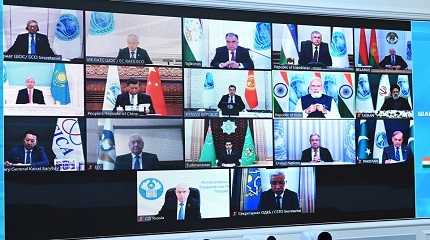
NEW DELHI, July 4 (Reuters) - The leaders of China, India, Russia and Pakistan on Tuesday sought to forge closer ties and boost cooperation within the Shanghai Cooperation Organisation (SCO) group as it seeks to expand its reach and counter Western influence in the region.
India's Prime Minister Narendra Modi, Russia's President Vladimir Putin, China's President Xi Jinping, Pakistan's Prime Minister Shehbaz Sharif and leaders of four central Asian countries attended a virtual summit of the political and security group formed in 2001 by Beijing and Moscow.
Iranian President Ebrahim Raisi also took part in the proceedings as Tehran is due to join as the ninth member on Tuesday and Belarus will sign a memorandum of obligations which will lead to its membership later.
When both countries, which have observer status and close ties to Moscow, are accepted as members of the SCO it will expand the grouping's western flank in both Europe and Asia.
In his address from Beijing to the online summit, Xi called for strengthening exchanges and mutual learning among SCO members and efforts to safeguard regional peace and ensure common security, Chinese state media reported.
He urged the grouping to focus on pragmatic cooperation to speed up economic recovery and to follow the right direction and enhance solidarity and mutual trust.
Putin, making his first appearance at an international forum since a short-lived mutiny last month, reassured the leaders of Russia's stability and unity.
Moscow, Putin said, planned to boost ties with SCO and supported the transition to local currencies for trade settlement. He also warned that the potential for conflicts and the risk of a global economic crisis were on the rise.
Putin thanked members of the SCO who he said had expressed their support for his efforts "to protect the constitutional order, the lives and security of citizens".
He told them that Russia would stand up against Western pressure, sanctions and "provocations" imposed over what Moscow calls its "special military operation" in Ukraine.
Russia views countries such as China, India and Iran - the newest member of the SCO - as key partners in confronting the United States and resisting what it portrays as U.S. attempts to dictate the world order.
The summit takes place barely two weeks after Modi was hosted by U.S. President Joe Biden for a state visit, and the two countries called themselves "among the closest partners in the world".
DIPLOMATIC TIGHTROPE
India, which holds the presidency of SCO and the G20 this year, has walked a diplomatic tightrope as relations between Western nations and a Russia-China partnership have been fraught due to Moscow's invasion of Ukraine last year, and Beijing's growing assertive presence in the global geopolitical theatre.
Speaking earlier as he opened the summit, Modi urged SCO members to jointly fight terrorism, help Afghanistan and tackle global challenges such as food, fuel and fertiliser shortages.
He said the world is embroiled in disputes, tensions and the impact of the pandemic and global food, fuel and fertiliser crises are big challenges for all countries.
"We need to think together that are we, as a group, capable of meeting the expectations and ambitions of our people? Are we capable of facing modern challenges?" Modi said. "Is SCO becoming a group that is completely ready for the future?"
Putin spoke to Modi in a call last week in the aftermath of the mercenary mutiny. During the discussion, Modi reiterated a call for dialogue and diplomacy regarding the war in Ukraine.
Last year on the sidelines of the summit in Uzbekistan, Modi told Putin that it was not the era of war, which is the closest India has come to addressing the issue directly with the Russian leader.
Both Putin and Xi are expected to visit New Delhi in September as India hosts the G20 summit, and Biden and leaders of other member nations are also likely to be present.
India has refused to blame Russia for the war and increased bilateral trade largely by lifting purchases of Russian oil to a record high, which has irked several Western capitals.
Pakistan's Sharif said the international community finds itself in a standstill on Afghanistan and that critical support needed by Kabul to prevent a humanitarian crisis has been withheld.
"This policy needs an urgent reset," Sharif said.
"The international community should meaningfully engage with the interim Afghan government to take the next steps. Similarly, the interim Afghan government should take concrete measures to ensure its soil is not used for terrorism by any entity."
No country, including Pakistan, has formally recognised the Taliban's administration since it took over the country in 2021. A cut in development aid by foreign donors and sanctions on its banking sector have severely hampered the economy.




